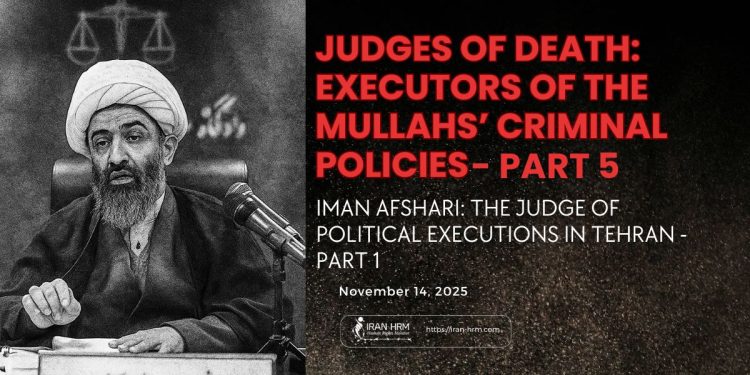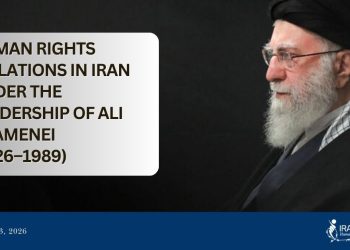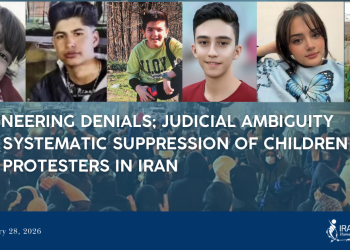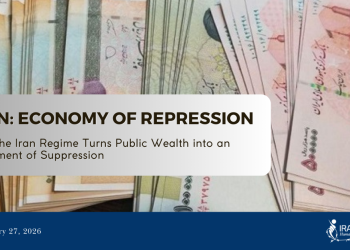Iman Afshari, the head of Branch 26 of the Tehran Revolutionary Court, is one of the notorious figures within the judiciary of the ruling regime in Iran—an individual who has no university education in law and has studied only in religious seminaries. He is not a judge in the legal sense, but a direct executor of the will of the security agencies. His name is tied to the issuance of death sentences, torture, and gross violations of the fundamental principles of fair trial.
Since the winter of 2019 (1397), Afshari has served as a judicial arm of repression, playing a central role in eliminating political opponents, civil society activists, protesting women, and religious minorities. Branch 26 of the Revolutionary Court, established for security-related cases, became one of the main centers of political intimidation during his tenure. Numerous prisoners have testified that he does not read case files and issues verdicts solely on the basis of reports from the Ministry of Intelligence and the Revolutionary Guards. One defendant has recounted: “Afshari said that the analysis of the security agencies is sufficient for issuing a verdict.”
The Neutrality of the Victim: When Security Analysis Replaces the Law
Iman Afshari’s conduct shows that, in his view, the law is merely a tool for justifying security-driven decisions. A clear example of this approach is the case of filmmaker Mohammad Rasoulof. In July 2019 (Tir 1398), Afshari sentenced him to one year in prison and to social deprivation. When Rasoulof asked him whether he had even seen his films, Afshari explicitly replied: “No; the analysis of the security agencies is sufficient for issuing a verdict.” This open admission demonstrates how little value the law holds in comparison with the will of the security apparatus.
Many political prisoners and prison guards have also recounted his insulting behavior. Human rights defender Atena Daemi wrote in her testimony that Afshari told her father in court: “You must answer to the children of the martyrs. What kind of dishonorable man are you to have raised such a daughter!” This language is not only an insult to families but a blatant violation of human dignity.
Reproducing Death in the Guise of Law
From the first day of Afshari’s tenure, death became a judicial routine. Detainees, in trials lasting only a few minutes, without a lawyer and without any possibility to defend themselves, faced verdicts that had already been written in security bulletins. In recent years, Afshari has issued hundreds of long prison sentences and dozens of death sentences against political prisoners.
In cases involving supporters of the People’s Mojahedin Organization of Iran, he issued multiple death sentences based on the Sharia-based charge of baghi (armed rebellion). Among those sentenced to death by him are Abolhassan Montazer (65, a political prisoner from the 1980s), Pouya Ghobadi (32, an electrical engineer), Vahid Bani-Amrian (32, holding a master’s degree in management), Babak Alipour (33, holding a bachelor’s degree in law), Mohammad Taghavi (58), and Ali-Akbar Daneshvarkar (57, a civil engineer). All of these prisoners were subjected to torture, violent interrogations, and prolonged solitary confinement, and were deprived of access to an independent lawyer.
Afshari also issued additional death sentences for other prisoners, including for Pakhshan Azizi and four Kurdish prisoners: Mohsen Mazloum, Pejman Fatehi, Hezhir Faramarzi, and Vafa Azarbar, as well as Habib Asyud, an Ahvazi Arab dual national whose execution was carried out at dawn on 6 May 2023 (16 Ordibehesht 1402). These cases, marked by vague charges and lacking clear evidence, demonstrate his role in the systematic repression of ethnic groups and minorities.
Within just one five-month period, nine death sentences were issued from his branch—an indication of how the judiciary, in his hands, has become a direct instrument of political elimination.
The Execution of Behrouz Ehsani Eslamlu and Mehdi Hassani: The Peak of Judicial Killing
On 27 July 2025 (5 Mordad 1404), two political prisoners, Behrouz Ehsani Eslamlu and Mehdi Hassani, were executed in Qezel Hesar Prison based on verdicts issued directly by Iman Afshari. They were tried on the charge of “enmity against God through links with the People’s Mojahedin Organization of Iran”—a charge lacking any legal evidentiary basis. For months, their families were kept uninformed about their place of detention and the progress of their cases until the sudden notification that the executions had been carried out.
During their detention, the two prisoners were subjected to torture and psychological pressure and were tried in a hearing lasting only a few minutes and held without the presence of a lawyer. Amnesty International described these executions as a “gross violation of the right to life,” and UN Special Rapporteurs deemed them an act of “judicial killing.” The organization Iran Human Rights also stated that Afshari has become the new face of Judge Salavati.
The execution of these two prisoners is emblematic of the systematic use of the death penalty to intimidate society, within a structure where the law serves only as a façade for eliminating political opponents.
Judicial Misogyny: Heavy Sentences Against Women Protesters
In Iman Afshari’s record, dozens of women have been convicted solely for defending freedom and human dignity. In court, he speaks in an insulting tone and views protesting women as a threat to the regime’s patriarchal order.
Among his victims are Forough Taghipour and Marziyeh Farsi, each sentenced to 15 years in prison. Arghavan Fallahi and Shiva Esmaeili, two other political prisoners, confronted Afshari during his visit to the women’s ward of Evin Prison in January 2024 (Dey 1402) and protested the uncertainty surrounding their cases. His response was to cut their telephone access and threaten them with exile.
Mojgan Ilanlou, a documentary filmmaker and social activist, was sentenced to 10 years in prison, 74 lashes, and various social bans for supporting the 2022 uprising and publishing images without compulsory hijab.
Nazila Maroufian, a journalist from Saqqez, was also sentenced—without a lawyer and without any defense hearing—to two years in prison, a five-year travel ban, and a fine for interviewing Mahsa Amini’s father.
Afshari’s behavior toward women detainees has likewise been insulting. Accounts from political prisoners in the women’s ward of Evin show that during this judge’s visit in January 2024 (Dey 1402), many women shouted in protest against the uncertainty of their cases and the heavy sentences and confronted him directly. This reaction reflected the depth of dissatisfaction with his oppressive conduct. Yet instead of addressing the prisoners’ demands, the result of these protests was the imposition of new restrictions, including cutting off phone calls and threats of exile.
Afshari has also been a leading figure in repressing women’s rights and women activists, especially opponents of compulsory hijab. He sentenced three anti–compulsory hijab activists to a total of 58 years in prison.
In September 2019 (Shahrivar 1398), Afshari sentenced Fereshteh Didani, a women’s rights activist and opponent of compulsory hijab, to 30 years in prison on charges of “assembly and collusion against national security, propaganda against the regime, encouraging people to corruption and prostitution, insulting the Supreme Leader, and insulting Khomeini.”
Another women’s rights activist and opponent of compulsory hijab, Saba Kord-Afshari, was also sentenced by Afshari at the same time to 24 years in prison on charges of “spreading corruption and prostitution through removing the hijab and walking without hijab, propaganda against the regime through links with opposition groups and plans for a soft overthrow, and assembly and collusion against the regime through contacts with foreign media.”
In December 2019 (Azar 1398), Iman Afshari also sentenced Raheleh Ahmadi, the mother of Saba Kord-Afshari, to four years and two months in prison on charges of “assembly and collusion against national security through cooperation with ‘hostile’ media and propaganda against the ruling regime.”
Sentences against Asrin Derkaleh, Nahid Shaghaghi, Maryam Mohammadi, and Akram Nasrian—women’s rights activists and members of the Neda-ye Zanan-e Iran Association—each to four years in prison were also issued by Afshari.
Accounts from women prisoners show that he humiliates them with terms such as “immoral” and “corrupt,” and describes imprisonment as a way to “purify sin”—a mindset that exposes the direct link between enforced Sharia and gender-based repression. In reality, Afshari’s conduct toward women is not limited to issuing sentences; it constitutes a form of psychological torture and systematic humiliation. In his courtroom, women are not merely defendants but are treated as “sinners” with no opportunity for a fair defense. This security-driven and gender-biased view has made women a primary target of repression and reveals Afshari’s role in perpetuating structural discrimination against half of society.
This persistent pattern of humiliation and repression is only one dimension of Iman Afshari’s conduct. The next report will examine the broader and less documented aspects of his role within the ideological and security mechanisms of the judiciary.







